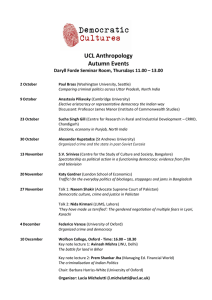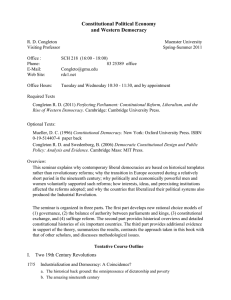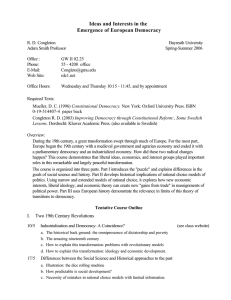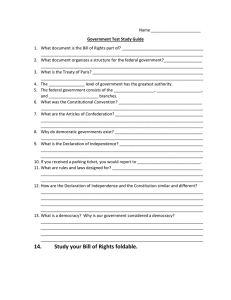REFERENCES
advertisement
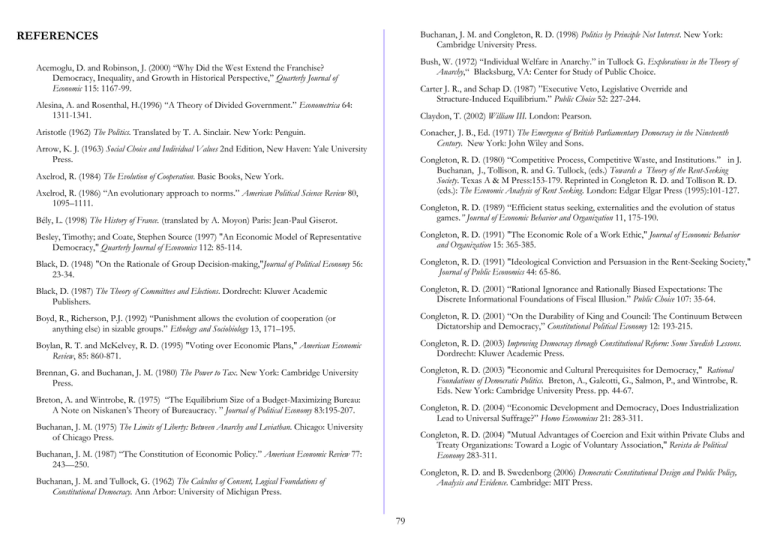
REFERENCES Buchanan, J. M. and Congleton, R. D. (1998) Politics by Principle Not Interest. New York: Cambridge University Press. Bush, W. (1972) “Individual Welfare in Anarchy.” in Tullock G. Explorations in the Theory of Anarchy,“ Blacksburg, VA: Center for Study of Public Choice. Acemoglu, D. and Robinson, J. (2000) “Why Did the West Extend the Franchise? Democracy, Inequality, and Growth in Historical Perspective,” Quarterly Journal of Economic 115: 1167-99. Carter J. R., and Schap D. (1987) ”Executive Veto, Legislative Override and Structure-Induced Equilibrium.” Public Choice 52: 227-244. Alesina, A. and Rosenthal, H.(1996) “A Theory of Divided Government.” Econometrica 64: 1311-1341. Claydon, T. (2002) William III. London: Pearson. Aristotle (1962) The Politics. Translated by T. A. Sinclair. New York: Penguin. Conacher, J. B., Ed. (1971) The Emergence of British Parliamentary Democracy in the Nineteenth Century. New York: John Wiley and Sons. Arrow, K. J. (1963) Social Choice and Individual Values 2nd Edition, New Haven: Yale University Press. Congleton, R. D. (1980) “Competitive Process, Competitive Waste, and Institutions.” in J. Buchanan, J., Tollison, R. and G. Tullock, (eds.) Towards a Theory of the Rent-Seeking Society. Texas A & M Press:153-179. Reprinted in Congleton R. D. and Tollison R. D. (eds.): The Economic Analysis of Rent Seeking. London: Edgar Elgar Press (1995):101-127. Axelrod, R. (1984) The Evolution of Cooperation. Basic Books, New York. Axelrod, R. (1986) “An evolutionary approach to norms.” American Political Science Review 80, 1095–1111. Bély, L. (1998) The History of France. (translated by A. Moyon) Paris: Jean-Paul Giserot. Congleton, R. D. (1989) “Efficient status seeking, externalities and the evolution of status games.” Journal of Economic Behavior and Organization 11, 175-190. Besley, Timothy; and Coate, Stephen Source (1997) "An Economic Model of Representative Democracy," Quarterly Journal of Economics 112: 85-114. Congleton, R. D. (1991) "The Economic Role of a Work Ethic," Journal of Economic Behavior and Organization 15: 365-385. Black, D. (1948) "On the Rationale of Group Decision-making,"Journal of Political Economy 56: 23-34. Congleton, R. D. (1991) "Ideological Conviction and Persuasion in the Rent-Seeking Society," Journal of Public Economics 44: 65-86. Black, D. (1987) The Theory of Committees and Elections. Dordrecht: Kluwer Academic Publishers. Congleton, R. D. (2001) “Rational Ignorance and Rationally Biased Expectations: The Discrete Informational Foundations of Fiscal Illusion.” Public Choice 107: 35-64. Boyd, R., Richerson, P.J. (1992) “Punishment allows the evolution of cooperation (or anything else) in sizable groups.” Ethology and Sociobiology 13, 171–195. Congleton, R. D. (2001) “On the Durability of King and Council: The Continuum Between Dictatorship and Democracy,” Constitutional Political Economy 12: 193-215. Boylan, R. T. and McKelvey, R. D. (1995) "Voting over Economic Plans," American Economic Review, 85: 860-871. Congleton, R. D. (2003) Improving Democracy through Constitutional Reform: Some Swedish Lessons. Dordrecht: Kluwer Academic Press. Brennan, G. and Buchanan, J. M. (1980) The Power to Tax. New York: Cambridge University Press. Congleton, R. D. (2003) "Economic and Cultural Prerequisites for Democracy," Rational Foundations of Democratic Politics. Breton, A., Galeotti, G., Salmon, P., and Wintrobe, R. Eds. New York: Cambridge University Press. pp. 44-67. Breton, A. and Wintrobe, R. (1975) “The Equilibrium Size of a Budget-Maximizing Bureau: A Note on Niskanen’s Theory of Bureaucracy. ” Journal of Political Economy 83:195-207. Congleton, R. D. (2004) “Economic Development and Democracy, Does Industrialization Lead to Universal Suffrage?” Homo Economicus 21: 283-311. Buchanan, J. M. (1975) The Limits of Liberty: Between Anarchy and Leviathan. Chicago: University of Chicago Press. Congleton, R. D. (2004) "Mutual Advantages of Coercion and Exit within Private Clubs and Treaty Organizations: Toward a Logic of Voluntary Association," Revista de Political Economy 283-311. Buchanan, J. M. (1987) “The Constitution of Economic Policy.” American Economic Review 77: 243—250. Congleton, R. D. and B. Swedenborg (2006) Democratic Constitutional Design and Public Policy, Analysis and Evidence. Cambridge: MIT Press. Buchanan, J. M. and Tullock, G. (1962) The Calculus of Consent, Logical Foundations of Constitutional Democracy. Ann Arbor: University of Michigan Press. 79 Congleton, R. D. and V. Vanberg (1992) “Rationality, morality and exit.” American Political Science Review 86, 418–431. Hobbes, T. (1959) Leviathan. New York: E. P. Dutton. Holmberg, E. and N. Stjernquist. 1996. The Constitution of Sweden: Constitutional Documents of Sweden. Translated by U. K. Nordenson, F. O. Finney, and K. Bradfield. Stockholm: the Swedish Riksdag. Congleton, R. D. and V. Vanberg (2001) "Help, Harm or Avoid: On the Personal Advantage of Dispositions to Cooperate and Punish in Multilateral PD Games with Exit ," Journal of Economic Behavior and Organization 44: 145-167. Holmberg, E. and Stjernquist, N. (1995) Constitutional Documents of Sweden. Stockholm: The Swedish Riksdag. Dixit, A., Grossman, G. and G., Faruk (2000). “The Dynamics of Political Compromise.” Journal Political Economy, 108:531-568. Dudley, L. (2000) “The Rationality of Revolution.” Economics of Governance I:77-103. Immergut, E. M 2002. “The Swedish Constitution and Social Democratic Power: Measuring the Mechanical Effect of a Political Institution.” Scandinavian Political Studies 25: 231-257. Dudley, L. M. (1991) The Word and the Sword: How Techniques of Information and Violence Have Shaped our World, Oxford: Blackwell. Israel, J. I. (1998) The Dutch Republic: Its Rise, Greatness, and Fall 1477-1806. Oxford: Clarendon Press. Feld, L. P.; Savioz, M. R.(1997) "Direct Democracy Matters for Economic Performance: An Empirical Investigation," Kyklos. Johnson, P. (1997) A History of the American People. New York: Harper-Collins. Kuran, T. (1989) “Sparks and Prairie Fires: A Theory of Unanticipated Political Revolution.” Public Choice 61: 41-74. Frank, R. H. (1985) Choosing The Right Pond, Human Behavior and the Quest for Status. (Oxford University Press, New York). Lee, S. J. (2002) Aspects of British Political History, 1815-1914. London: Rutledge. Gordon, S. (1999) Controlling the State: Constitutionalism from Ancient Times to Today. Cambridge, Mass.: Harvard University Press. Lewin, L. (1988) Ideology and Strategy, A Century of Swedish Politics. Cambridge: Cambridge University Press. Grossman, H. I. (1991) "A General Equilibrium Model of Insurrections," American Economic Review. Lindert, P. H. (1986) “Inequal English Wealth since 1670,” Journal of Political Economy 94: 1127-1162. Grossman, G. M. and Helpman, E. (1996) "Electoral Competition and Special Interest Politics." Review of Economic Studies. McKelvy, R. (1976) “Intransitivities in Multidimensional Voting Models and Some Implications for Agenda Control.” Journal of Economic Theory 12:472-482. Hadenius, S. 1999. Swedish Politics during the 20th Century: Conflict and Consensus. Stockholm: The Swedish Institute. Mommsen, W. J. (1995) Imperial Germany 1867-1918. (Translation of Der Autoritäre Nationalstaat, by R. Deveson) New York: Oxford University Press. Hammon, T. and Miller, G. J. (1987) “The Core and the Constitution,” American Political Science Review 81:1155-74. Morgan, K. O. ed. (1997) The Oxford Illustrated History of Britain. New York: Oxford University Press. Heclo, H. and H. Madsen. 1987. Policy and Politics in Sweden: Principled Pragmatism. Philadelphia: Temple University Press. Mueller, D. C. (2000) Constitutional Democracy. New York: Oxford University Press. Mueller, D. (1989) Public Choice II. New York: Cambridge University Press. Herlitz, N. 1939. Sweden: A Modern Democracy on Ancient Foundations. Minneapolis: University of Minnesota Press. Niskanen, W. A. (1969) “Nonmarket Decision-making: The Peculiar Economics of Bureaucracy.” American Economic Review Papers and Proceedings 59: 293-305 Hill, B. (1996) The Early Parties and Politics in Britain, 1688-1832. London: MacMillan Press. North, D. C., and Weingast, B. R. (1989) “Institutions and Commitment: The Evolution of Institutional Governing, Public Choice in Seventeenth-Century England.” Journal of Economic History 49: 803-832. Hirsch, F. (1995) Social Limits to Growth. London: Routledge. Hirschman, A. O. (1994) "The On-and-Off Connection between Political and Economic Progress," American Economic Review. North, D. C. (1987) “Institutions, Transactions Costs and Economic Growth.” Economic Inquiry 25, 419-428. Hirshleifer, J. (2001) The Dark Side of the Force: Economic Foundations of Conflict Theory. New York: Cambridge University Press. Olson, M. (2000) Power and Prosperity. New York: Basic Books. 80 Olson, M (1993) "Dictatorship, Democracy, and Development," American Political Science Review 87: 567-576. Verney, D. V. (1957) Parliamentary Reform in Sweden 1866-1921. London: Oxford at the Clarendon Press. Olson, M. (1965) The Logic of Collective Actdion. Cambridge: Harvard University Press. Voigt, S. (1999a) “Breaking with the Notion of Social Contract: Constitutions as Based on Spontaneously Arisen Institutions.” Constitutional Political Economy 10:283-300. Ostrom, E. (2005) Understanding Institutional Diversity. Princeton: Princeton University Press. Palmer, R. R. and Colton, J. (1965) A History of the Modern World. New York: Alfred Knopf. Voigt, S. (1999) Explaining Constitutional Change: A Positive Economic Approach (New Thinking in Political Economy) Edward Elgar. Persson, T., Roland, G. and Tabellini, G. (1997) “Separation of Powers and Political Accountability,” Quarterly Journal of Economics 112: 1163-1202. Weibull, J. (1993) Swedish History in Outline. The Swedish Institute. Translated by P. B. Austin. Wintrobe, R. (1998) The Political Economy of Dictatorship. New York: Cambridge University Press. Persson, T. and Tabellini, G. (2000) Political Economics: Explaining Economic Policy. Cambridge Mass.: MIT Press. Petersson, O. (1994) The Government and Politics of Nordic Countries. Translated by F. G. Perry. Stockholm: CE Fritzes AB (Kluwer). Petersson, O. (1994) The Government and Politics of Nordic Countries. Translated by F. G. Perry. Stockholm: CE Fritzes AB (Kluwer). Pugh, M. (1999) Britain Since 1789, A Concise History. New York: Palgrave. Rawls, J. (1971) A Theory of Justice. Cambridge, MA: Harvard University Press. Ruin, O. 1990. Tage Erlander: Serving the Welfare State, 1946–1969. Pittsburgh, Pa.: University of Pittsburgh Press. Schap, D. (1986) “Executive Veto and Informational Strategy: A Structure Induced Equilibrium Analysis.” American Journal of Political Science 30:755-770. Shepsle, K. A. (1979) "Institutional Arrangements and Equilibrium in Multidimensional Voting Models." American Journal of Political Science 23: 27-59. Shepsle, K. A., and Weingast, B. R. (1981) "Structure Induced Equilibrium and LegislativeChoice." Public Choice 37:503-519. Skogh, G. and Stuart, C. (1982) “A Contractarian Theory of Property Rights and Crime,” Scandinavian Journal of Economics 84:27-40. Strayer, J. R. and Gatzke, H. W. (1978) The Mainstream of Civilization, New York: Harcourt Brace, Jovanovich. Tilly, C. (2004) Contention and Democracy in Europe, 1650-2000. Cambridge: Cambridge University Press. Tsebelis, G. (2002) Veto Players: How Political Institutions Work. Princeton: Princeton University. Tullock, G. (1987) Autocracy. Dordrecht: Marinus Nijhoff. Tullock, G. (1974) The Social Dilemma. Blacksburg: Center for Study of Public Choice. 81
